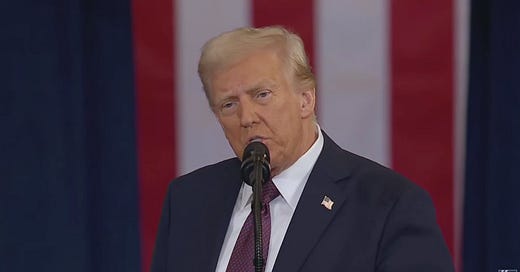Full story at BrokenTruth.TV.
In his second-term inauguration speech on January 20, 2025, former President Donald Trump not only referenced the Alien Enemies Act of 1798 but also made a bold statement about drug cartels:
"I will immediately designate the cartels as foreign terrorist organizations. We're going to do it immediately. And we'll unleash the full power of federal law enforcement, ICE, Border Patrol."
This declaration, combined with his mention of invoking the Alien Enemies Act, suggests a multifaceted approach to tackle both illegal immigration and the drug cartels' influence both within and outside the United States.
The Historical Context of the Alien Enemies Act:
Originally enacted to protect the U.S. during the Quasi-War with France, the Alien Enemies Act was designed to give the President the authority to detain or deport individuals from nations considered hostile during wartime. While its historical use was for national security in times of declared war, Trump's proposal hints at a reinterpretation for modern challenges, particularly the threats posed by organized crime and illegal immigration.
Key Provisions and Modern Interpretations:
Detention and Deportation: This could extend to members of drug cartels or individuals from countries involved in international crime, treating them as threats akin to those from an enemy state.
Trump's Statements and Their Implications:
Designating Drug Cartels as Terrorist Organizations:
Trump's intention to classify Mexican drug cartels as "foreign terrorist organizations" would allow the U.S. to apply terrorism-related laws, leading to stricter measures like financial sanctions, asset freezing, and the criminalization of support for these groups. This move would significantly increase the legal tools available to combat drug trafficking and associated violence, treating cartels with the same severity as groups like Al-Qaeda or ISIS.
Using the Alien Enemies Act Against Cartels:
Inside the U.S.: By treating cartel members as alien enemies, Trump could theoretically bypass some due process norms to expedite their detention and deportation, particularly if they are from countries he labels as hostile. This would be contentious legally but could appeal to those advocating for aggressive action against cartels. The act would serve as a mechanism to quickly remove criminal elements without the usual legal proceedings, although this would likely face immediate judicial review and civil rights challenges.
Outside the U.S.: Although the act itself pertains to actions within U.S. borders, the designation of cartels as terrorist organizations could justify international cooperation or covert actions against cartel infrastructure in countries like Mexico, with or without local government consent. This approach could involve military or intelligence operations, potentially leading to diplomatic tensions or even conflicts with neighboring countries. It raises questions about sovereignty, international law, and the ethics of U.S. intervention in foreign territories.
The Damage Done by Cartels with Drugs Like Fentanyl:
Fentanyl Overdoses: The impact of fentanyl, a synthetic opioid 50 times more potent than heroin, has been catastrophic. In 2023 alone, over 73,000 Americans died from fentanyl overdoses, contributing to a total of 112,000 drug overdose deaths that year. Over the last 20 years, the U.S. has seen a quadrupling in the age-adjusted rate of drug overdose deaths, with synthetic opioids like fentanyl being the primary drivers of this surge.
Cartel Violence: Beyond drugs, the cartels have contributed to violence within the U.S. through gang-related activities and direct violence. While exact numbers for U.S. deaths directly attributable to cartel violence are harder to quantify due to the covert nature of many operations, the violence associated with cartels has undoubtedly led to numerous deaths, both through direct confrontations and collateral damage from their criminal enterprises.
Criminal Illegal Aliens Harming U.S. Citizens:
Laken Riley: Her tragic murder by Jose Antonio Ibarra, an undocumented immigrant, has been cited as a stark example of the need for stringent immigration controls. This case has fueled debates about the efficacy of current immigration policies and the potential dangers of not enforcing them more rigorously.
Cory Alvarez: A Haitian migrant brought to the U.S. under a parole program, Alvarez was accused of raping a disabled girl in Boston. His case underscores the risks associated with inadequate vetting or follow-up of migrants.
Jesus Ascencio-Molina: Deported in 2013 but returned illegally to Oregon, where he allegedly stabbed an 86-year-old man during an attempted carjacking. This incident highlighted the challenges posed by repeat offenders who re-enter the country.
Alejandro Cota: With a criminal history over 33 years, Cota's arrest in Illinois for the murder of a mother and her 13-year-old son illustrates the ongoing threat from criminal illegal aliens who manage to avoid deportation.
Legal and Practical Implications:
Legal Challenges: The use of the Alien Enemies Act in this context would face significant legal scrutiny due to its original intent for wartime scenarios, not peacetime criminality or organized crime. Critics argue that such an application could violate constitutional rights, leading to potential Supreme Court cases.
Political Reaction: While there's support for tackling drug cartels and reducing crime by undocumented immigrants, there's also considerable opposition to what some see as overreach or potential human rights abuses. The political landscape could become polarized, with debates over civil liberties, national security, and international law.
Feasibility: The practical application would require navigating international law, ensuring cooperation or at least non-hostility from countries where cartels operate, and managing domestic legal challenges. It would also necessitate a redefinition of how "war" or "invasion" is interpreted in legal terms.
Conclusion:
Trump's dual focus on invoking the Alien Enemies Act and designating cartels as terrorist organizations marks a potentially transformative approach to dealing with immigration-related crime and the drug trade. The staggering number of lives lost to fentanyl and cartel-related violence underscores the urgency of these measures. However, this strategy would need to carefully balance national security interests with respect for legal norms and international relations. The debate around these moves captures the tension between security, legality, and humanitarian considerations in U.S. policy-making, echoing broader discussions on immigration, crime, national sovereignty, and the global fight against drug cartels. Whether this approach would lead to a safer America or set a precedent for controversial executive overreach remains a subject of intense national and international discourse.
Demand Media Tell Your Stories
Click this button to submit audience feedback to all the major networks & studios demanding that the stories they omitted be told. All the hard work done for you!
Add your name to the end of the email and send it. Thank you!
Check out our documentary “Epidemic of Fraud”. Learn how the people who helped bring fentanyl to the market tried to convince the American people that a drug similar to tonic water was deadly. Watch now.















Share this post